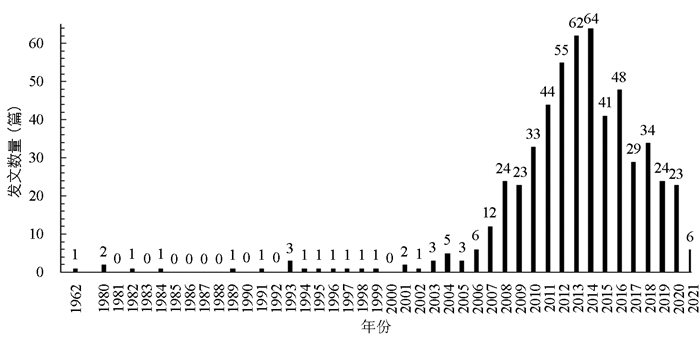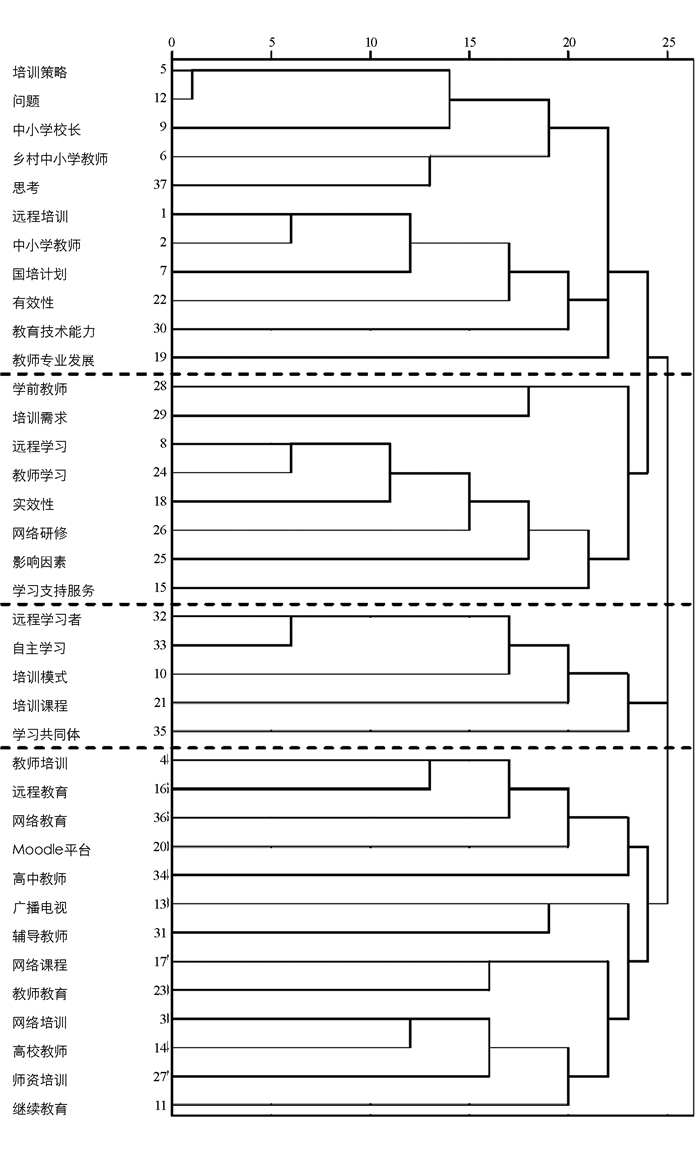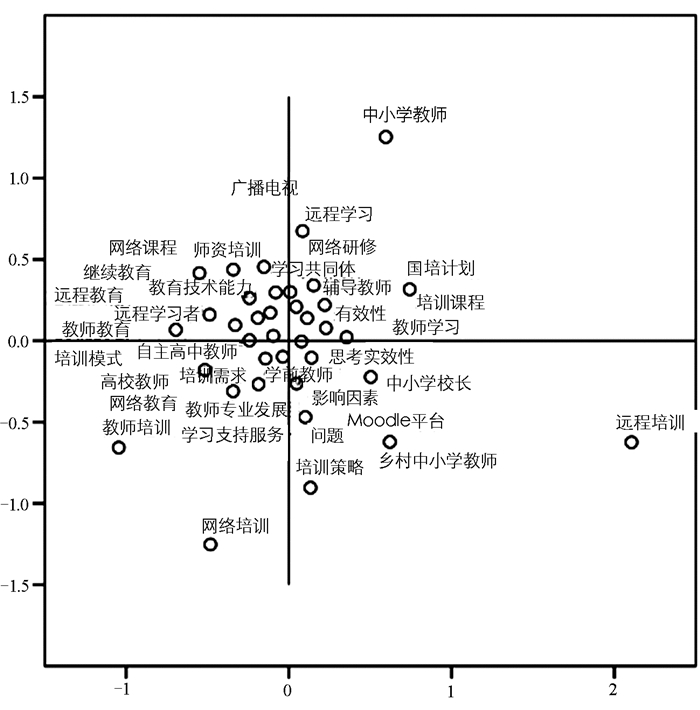-
教师远程培训是在时空分离的状态下,通过多媒体手段向在职教师提供专业化的学习机会、理想化的学习环境、高质量的学习资源,并为培训教师与参训教师之间以及参训教师之间的沟通交流搭建现代化互动平台的一种培训方式[1]。信息技术的快速发展推动了我国教师远程培训逐渐从边缘走向中心,成为与集中培训、校本培训并列的教师培训“三驾马车”之一[2]。随着“互联网+”数据挖掘、资源关联等技术的日趋成熟,以及各种智能终端的推广普及,教师远程培训在培训规模、培训成本、培训时间等方面的优势持续扩大,使得教师随时随地学习、泛在学习成为现实[3]。基于此,对我国教师远程培训相关文献进行计量学分析和可视化分析,可以厘清教师远程培训研究的热点领域,把握相关研究的发展趋势并预测未来走向,从而推动教师远程培训的有序发展。
全文HTML
-
首先,在中国知网等数据库中输入“教师远程培训”“教师网络培训”“教师在线培训”等主题词,进行相关检索,时间跨度设置为1949年10月至2021年6月,共检索出791篇文献,剔除重复无关的报刊、通知等无效数据,获取有效样本558篇。其次,将文献导入Bicomb 2中,提取并统计年份、关键词等数据,生成词篇矩阵,筛选出高频关键词,并通过普莱斯公式算出高频关键词的阈值。再次,运用SPSS 25.0软件系统的聚类分析、多维尺度分析等功能处理词篇矩阵,绘出高频关键词树状图和分布图。最后,基于知识图谱系统分析教师远程培训的研究主题及研究热点领域。
-
从发文量走势来看,教师远程培训研究的发文量总体呈动态上升趋势(见图 1)。研究内容从偏重“技术化”倾向的教师远程培训流程方面转向构建具有“智慧化”特性的教师远程培训体系方面,从对教师远程培训中“术”的强调转向对“人”的观照。1962年,《人民教育》刊载了中华人民共和国成立以来的第一篇教师远程培训的文章——《深受教师欢迎的“广播讲座”》。文章谈到,以广播为载体开展教师远程培训,其目的是帮助教师备课、改进教学方法。为此,主办方聘请了全国各省五十多名优秀教师、录制了七十多个主题讲座,详细阐述了广播培训的实施方式[4]。2000年之前,受教学设施和技术条件的限制,远程培训作为教师培训的辅助手段,与之相关的理论探索较少,为数不多的研究集中在介绍利用广播、电视等设备实施远程培训的做法及经验上。进入21世纪,信息技术飞速发展,教师远程培训研究开始受到学术界重视,尤其是在2006年教育部借助中国教育资源服务平台牵头组织了“中小学教师新课程国家级远程培训”活动之后,相关研究成果的数量逐年递增。2014年,《教育部办公厅财政部办公厅关于做好2014年中小学幼儿园教师国家级培训计划实施工作的通知》颁布,强调了“积极开展教师远程培训”[5]。由此,该年教师远程培训研究的发文总量达到历史新高(64篇),其中与“国培计划”有关的教师远程培训研究成果显著增加。2015年,《教育部办公厅财政部办公厅关于做好2015年中小学幼儿园教师国家级培训计划实施工作的通知》颁布后,教师远程培训的主要对象开始转向乡村教师。2018年以来,《中共中央国务院关于全面深化新时代教师队伍建设改革的意见》《教师教育振兴行动计划(2018—2022年)》《中国教育现代化2035》等政策相继出台,明确提出大力开展“互联网+教师教育”的创新行动。教师远程培训研究迎来了新的发展机遇。
-
高频关键词可以直观反映教师远程培训研究热点。经过梳理,558篇文献的关键词共2 020个,其中最高被引文章的被引频次为54次,基于普莱斯公式得出高频阈值M=0.749×
$ \sqrt {54} $ =5.50[6]。选取出现频率≥5的37个关键词作为高频关键词(见表 1)。这些高频关键词反映了目前教师远程培训研究热点,如“中小学教师”“网络培训”“培训策略”“乡村中小学教师”“国培计划”等。 -
将Bicomb 2软件系统导出的词篇矩阵导入SPSS 25.0软件系统中进行聚类分析,可以揭示出高频关键词之间的亲疏关系,同时也呈现出教师远程培训研究热点领域。聚类结果如图 2所示。由此,归纳出教师远程培训研究的四大领域:一是教师远程培训的现状与策略研究,主要包括(乡村)中小学教师、中小学校长在远程培训中的发展现状、存在的问题及对策等;二是教师远程培训的需求与服务研究,包括教师远程培训的需求、实效性、影响因素和学习支持服务等;三是教师远程培训的课程与模式研究,包括教师远程培训的课程设置、模式选择和学习共同体建设等;四是教师远程培训的技术与平台研究,包括广播电视培训、网络培训及培训平台建设等。根据关键词的出现频次和文献发表量可知,教师远程培训的现状与策略、技术与平台是已有研究的重点。近年来,研究者逐渐加强了对教师远程培训的需求与服务、课程与模式的探索,反映出教师远程培训研究从强调“术”到注重“人”的转变。
-
在聚类分析结果的基础上绘制高频关键词分布图,能够了解教师远程培训研究各个领域的发展状况及其所处的地位,知晓研究领域的内部关系以及领域之间的相互影响情况,具体如图 3所示。从图 3中可知:第一象限类群主要由中小学教师、“国培计划”、网络研修、培训课程等主题词构成,向心度和密度均较大,类群内部之间的联系以及与其他类群之间的联系都较为紧密,位于教师远程培训研究网络的中心,是教师远程培训研究突出的热点;第二象限类群主要由远程教育、网络课程、教育技术能力、师资培训等主题词构成,密度较大而向心度较小,表明该部分内容已经形成一定规模,但与其他类群之间的联系不够紧密,在发展到一定程度后可能因为得不到有效提升而逐渐弱化;第三象限类群主要由学前教师、学习支持服务、培训需求、培训模式等主题词构成,内部之间的联系以及与其他类群之间的联系都比较松散,表明该部分内容处于热点研究领域的边缘,研究尚未成熟,需要研究者的更多关注和持续挖掘;第四象限类群主要由培训策略、远程培训、乡村中小学教师、中小学校长、影响因素、Moodle平台等主题词构成,在热点研究领域中表现活跃,具有较大的潜在发展空间,但容易被分解、演化成其他类群。
由此可见,教师远程培训研究具有以下特点:一是对培训需求、培训模式等主题的探索步入了“瓶颈期”,后续研究需要突破已有范式,不断拓宽新领域、探寻新思路;二是学术界越来越重视对学前教师、学习支持服务等主题的研究,但相关成果未形成体系,需要持续、系统和深入研究;三是乡村中小学教师等主题具有广阔的发展空间,将会长期作为教师远程培训研究的热点。
一. 教师远程培训研究的基本走势
二. 教师远程培训研究的主要热点
1. 高频关键词统计分析
2. 高频关键词聚类分析
3. 高频关键词坐标分析
-
基于可视化分析结果,对热点领域进行归类整理,可以帮助研究者洞察教师远程培训研究的概貌及其热点发展趋势。从整体上看,教师远程培训研究呈现出从重视经验介绍、技术讲解、平台展示的“技术化”价值取向,转向重视培训教师的素养和参训教师的需求、落实教师专业发展措施的“智慧化”价值取向。相关部门在发挥远程教育技术促进教师专业知识技能传播功能的同时,还要运用现代化信息技术精准定位参训教师的发展需求,从而更好地开展智能化、泛在化与个性化的远程培训。
-
作为研究者重点关注的领域,现状与策略研究对了解教师远程培训的发展状况、破解培训困境、提升培训质量具有重要意义。已有成果主要采用定量与定性相结合的方法,从培训时间、培训内容、培训形式、培训机构、培训管理、考核评价、培训效果、培训满意度等方面,对中小学教师及校长远程培训的现状进行了调查研究,提出了完善规划设计、健全工作机制、强化专家团队、拓展支持平台等改进策略。同时,这一领域的研究者还倾向对教师运用教育技术的能力、“国培计划”的现状与实施策略等方面开展实证研究和案例分析。前者缘于2003年教育部启动了全国教师教育网络联盟计划;后者是因为2010年以来“国培计划”的实施,吸引了众多研究者的关注。随着信息技术的普及和中小学教师教育技术能力的提升,近年来相关成果的年发文量趋于平稳。总体而言,关于现状与策略研究的已有成果大都以“技术化”为导向,教师远程培训被视为合乎法则的、具有规范性的技术操作过程,教师则被看作是有知识技能缺陷的、需要改造的教育执行者[7]。“技术化”导向的教师远程培训研究,重视对培训效果、质量保障、项目实施、政策落实等方面的探索,提出的策略旨在通过完善远程培训的内容、方式、技术、管理等外部因素来提高培训的质量和效果,强调教师远程培训的工具性,相对忽视作为“人”的教师所具有的生命价值。同时,教师远程培训中存在的资源建设缺乏组织、学习方式缺乏互动、过程缺乏专家引领、项目管理缺乏机制等问题[8],是该领域后续研究需要重点关注的方面。此外,越来越多的研究者开始探索远程培训中参训教师的参训动机、培训获得感、互动学习以及混合式远程学习等具有“智慧化”倾向的研究领域[9]。
-
培训需求与服务是开展教师远程培训的前提,明确这一点有助于强化教师远程培训的针对性和实效性。《教育部关于大力加强中小学教师培训工作的意见》特别强调,要加强教师培训需求调研,充分发挥区县教师培训机构在集中培训、远程培训和校本研修中的组织协调、服务支持等方面的重要作用[10]。这一政策导向推动了远程培训需求与服务研究的兴起和发展。首先,在培训需求研究方面,已有成果着重对学前教师在培训时间、培训强度、培训环境、培训方式、培训考核、培训资源等方面的需求开展调查研究。但是,调查对象较为单一,对中小学教师、中小学校长、乡村教师等主体的培训需求调研有待进一步加强。另外,对参训教师在培训内容、培训课程、培训模式、培训评价、培训跟踪支持等方面的具体需求还应深入分析。其次,在培训服务方面,已有成果重点探讨了理论概述、服务设计、教学模式、资源建设、技术应用等方面,并从政策管理、资源服务、技术服务、人员服务和情感服务等角度提出了培训服务体系的构建策略。已有成果对资源建设的探讨相对较少,可是它关乎培训内容、培训质量以及培训效果等核心问题,因此研究力度要加大。最后,在影响因素方面,已有成果剖析了学校政策、培训内容、组织管理、交互问题、活动设计、评价反馈等外部因素对培训实施、培训效果、培训适应性、培训满意度等的影响,但尚未形成完整的教师远程培训影响因素体系,缺乏对有关参训教师学习态度、培训动机等内部影响因素的系统研究[11]。在远程培训中,教师掌握基本知识与技能是必要的,然而,在建设高素质专业化创新型教师队伍的时代背景下,仅仅重视教师知识、技能的发展还远远不够。“智慧化”价值取向的教师远程培训虽具有现代信息技术的优势,但还是要对参训教师“人”的要素如个性、兴趣、教学风格等加以尊重,既要立足于运用信息技术灵活诊断各种情况,又要合理满足参训教师的多元发展需求,为参训教师提供自主选择的时间与空间[12]。
-
开发优质培训课程,创新远程培训模式,为参训教师提供高质量的远程培训课程,是教师培训政策的主旨。分析显示,培训课程研究位于教师远程培训研究热点领域分布图的第一象限(见图 3),已有成果主要采用问卷、访谈、个案分析等方法剖析了教师远程培训的课程实施现状,其中涉及课程目标、课程内容、课程结构、课程反馈、课程设计、课程资源、课程开发等相关内容。同时,已有成果开始关注“智慧化”导向的教师远程培训,提出了“生成性课程”理念,即培训课程由参训教师与培训教师共同设计,尽可能整合参训教师的教学经验,满足参训教师的需求和志趣。但是,已有成果缺少专门针对乡村中小学教师、中小学校长、学前教师等主体的远程培训课程的探讨。此外,关于培训模式方面的研究已有一定的发文量,研究者通过实证调查与现状分析提出了远程研修模式、研究性学习模式、Sakai培训模式、课堂教学视频案例培训模式、集约化培训模式、网络研修模式、PCOT模型培训模式等不同的教师远程培训模式。然而,这些模式的提出主要是从培训教师的意愿、培训的可操作性或可行性等角度出发,未能充分顾及参训教师在特定培训模式中的主体地位及自主空间需求,相关研究大都针对具体培训问题进行探讨,“‘头痛医头、脚痛医脚’,系统性、操作性和推广性有待增强”[13]。可见,“技术化”导向的教师远程培训在课程设置与模式选择上大都是外在的、单一的,主要由培训机构、培训教师等外部力量所决定,在一定程度上忽视了参训教师专业发展的现实需求。“智慧化”导向的教师远程培训着力为参训教师提供更加丰富多样的课程资源和培训模式,既能引导参训教师积极参与培训课程的设置和开发,也能给予参训教师更多自主选择的机会,从而确保培训达到最佳效果。
-
远程培训研究涉及跨学科的理论、方法和技术,它借助不同时代的通讯科技为教师尤其是偏远地区的乡村教师提供了更多培训机会,在提高教师学历、提升教师素质、开展全员培训等方面作出了积极贡献,确保了教师培训效果。作为当前教师远程培训研究的重点和难点,技术与平台的研究要紧跟时代发展。一方面,伴随着“互联网+”信息技术的成熟,广播电视技术在教师远程培训中的应用逐渐减少,淡出了研究者的视野;另一方面,学术界开始着力探索诸如在线监控、小组协同、虚拟仿真、流媒体、人工智能等信息科技在教师远程培训中的运用,其目的是为参训教师提供时间灵活、内容丰富、形式多样、选择多元的培训。当前基于网络技术的Moodle课程管理系统为参训教师搭建了更加智能化的远程培训实施平台,引导参训教师利用平台提供的资源和工具规划自己的培训课程,极大地发挥了参训教师的主观能动性。“智慧化”导向的教师远程培训方可以借助云计算、大数据、虚拟现实、人工智能等前沿科技,预测参训教师在某一特定时期所需要的培训内容,并通过数据驱动及时跟进,为参训教师提供人机交互的示范演示[14]。这已成为新时代教师远程培训技术和平台发展的生长点,是后续研究亟待深入挖掘的“富矿区”。
一. 教师远程培训的现状与策略研究
二. 教师远程培训的需求与服务研究
三. 教师远程培训的课程与模式研究
四. 教师远程培训的技术与平台研究
-
互联网技术的快速发展使教师远程培训具备了超越时间和空间的优势,能够充分实现教育资源与信息的共建共享,成为解决区域教师专业化发展不均衡的有效手段[15]。在《中国教育现代化2035》《教育信息化2.0行动计划》等政策以及教育部“国培计划”示范性网络研修创新项目实施的大力推动下,教师远程培训的发展势如破竹,在教师专业化发展尤其是教师教育振兴进程中发挥着重要作用,相关研究表明,在对象拓展、课程设置、模式优化、评价运用、平台开发等方面,其都呈现出“智慧化”的趋向。“智慧化”教师远程培训基于参训教师的发展需求,依托智能信息技术,强调参训教师的深度参与,支持全面学习、自主学习、协作学习、创造学习和终身学习的教师培训理念[16]。鉴于此,新时代教师远程培训研究向“智慧化”方向发展的趋势,将会在远程培训的对象、课程、模式、评价和平台等方面取得新进展,实现新突破,产出新成果。
-
系统地研究“智慧化”教师远程培训对象,不仅有利于精准掌握不同类型教师远程培训的实际情况,还有助于推动教师远程培训事业的可持续发展。借助智能化与可视化手段,既能清楚哪些培训对象的研究有待加强,也能明确哪些方面的研究缺少深度探讨。教师远程培训研究在全面兼顾不同对象的同时,还要根据时代发展和教育改革的需要,对一些亟须重点关注的研究对象,如乡村教师、学前教师、培训教师等进行系统研究,有针对性地解决教师远程培训的现实困境。基于此,首先,要加强乡村教师远程培训研究,尤其是老少边穷岛地区的乡村教师。对乡村教师开展远程培训既有助于解决乡村学校地理位置偏远、交通不便、经费紧张等现实问题,也有利于破解长期困扰乡村教师培训的工学矛盾突出、培训资源匮乏、培训内容不切实际以及覆盖对象有限等问题。远程培训可以有效加强乡村教师的身份认同,确保乡村教师为乡村教育与乡村社会的持续发展安心从教[17]。其次,要重视学前教师远程培训研究,特别是偏远山区和边疆地区的学前教师。立足于远程培训扩大学前教师“国培”“省培”的规模和覆盖率,推动幼儿园园长和教师定期培训和全员轮训制度的实施,提升学前教师的整体素质尤其是科学保教综合能力,进一步解决学前教师队伍专业化程度不高、缺乏系统专业教育等问题。最后,要注重对培训教师远程培训素养的研究。“智慧化”教师远程培训以其手段的先进性和智能化,弥补了面授培训的诸多不足,然而也对培训教师的信息素养提出了更高要求。作为提高“智慧化”教师远程培训质量与效果的关键力量,培训教师需要具备自律的信息伦理道德、敏感的信息意识、专业的信息知识和熟练的信息处理技能。
-
课程作为培训活动开展的载体和媒介,是达成教师远程培训目标的基本保证。“智慧化”教师远程培训课程立足现代化信息技术,充分满足参训教师之间的差异化需求,为每位参训教师教研素养的提升提供了研创载体,具有多元性与选择性、生成性与发展性、泛在性与终身性、虚拟性与真实性等特点[18]。虽然有些学校也会借助网络公开课、慕课、在线课堂等平台开展教师远程培训,但由于培训内容不系统、不连贯,而且授课规模庞大、缺乏针对性,教师难以学有所获[19]。基于此,首先,加强对公开课、微课、慕课、私播课、翻转课、精品资源共享课、精品视频公开课等课程的个性化推送研究。“智慧化”教师远程培训方可以运用智能化科技,了解和分析每位参训教师的培训需求、教学状态以及优势和不足,定期向参训教师推送符合其需求的精品课程,增加培训内容的适切性与实用性。其次,开展面向“智慧化”教师远程培训的交互式视频课程设计与研究。交互式视频课程是以解决教学问题为导向,并结合真实的教学情境,为参训教师提供学习目标、学习内容、学习资源、模拟练习以及反馈评价,且辅之以问题学习、项目学习、模拟学习、协作学习与案例学习等教学方法,通过人机交互操作来促进参训教师实现深度学习的全新课程模式。交互式视频课程可以充分发挥参训教师的主体性和积极性,并有效检验培训效果。最后,加强对突破传统教材的数字课本的研究。“智慧化”教师远程培训的数字课本可以由“学材”“习材”“创材”构成,具有媒介性、交互性、关联性与开放性等特点。其中,“学材”用于知识的传授,“习材”用于知识的内化,“创材”用于知识的外显与迁移[20]。基于此,可以为参训教师构建出具有个性化、模块化、情景化、真实性和趣味性等特点的多维立体化课程体系。
-
“智慧化”教师远程培训更加重视参训教师的深度参与和参训教师彼此之间的灵活互动,旨在为参训教师提供优质高效的培训模式。一方面,要强化远程培训平台自身模式的混合化研究。除了为参训教师提供“录播视频学习—在线提问答疑—完成课后习题”的培训模式,还可以开展直播课程培训,即培训教师在线讲课,同参训教师实时互动,以增强培训教师与参训教师之间、参训教师与参训教师之间的交流。另外,还可以采取以下培训模式:“一对一”视频培训模式,即培训教师为参训教师提供个性化指导,增强参训教师的参与感和现场感;听评课直播培训模式,即远程直播参训教师的课堂教学,其他需要培训的教师观看课堂实录,并通过视频与参训教师交流讨论;远程教学观摩模式,即参训教师可以通过直播的方式观摩优秀教师的课堂教学,并同优秀教师进行即时的教学研讨等。另一方面,要增强远程培训与其他培训模式的混合化研究。这里的“混合”,不仅指线上线下的混合,还有集中面授与校本培训的混合[21]。“智慧化”教师远程培训是依据不同的培训内容、培训对象、培训投入以及培训条件等而采取的混合化培训模式,能够提高参训教师的参与度和培训的灵活性。例如:酌情混合远程培训和面授培训,实现二者的优势互补,在远程培训中,参训教师跨越时空限制,自定学习节奏,充分利用培训资源;在面授培训中,培训教师基于教学实践开展丰富的教研活动,促进参训教师将学理知识转化为实践行动。有机结合的混合化培训模式,能够最大限度地发挥培训的综合作用,有利于教师终身学习能力的养成[22]。此外,还可以针对培训中的不同问题,因“需”制宜组合培训模式。例如:针对教师培训中存在的校本培训资源不足、网络培训与教育教学实践结合不紧密、教师专业发展缺乏持续支持等问题,构建网络研修与校本培训相结合的培训模式等[23]。
-
当前,我国教师远程培训实践就整体而言,尚停留在对参训教师学习出勤、任务完成、过程性考核、终结性考评等表面数据的统计分析上,缺少对参训教师学习过程和参训后教学行为变化的跟踪与比较,因此难以如实、系统地了解远程培训的实施效果[24]。“智慧化”教师远程培训可以充分借助大数据分析全面掌握培训过程中参训教师的学习状态,深入挖掘数据之间的相互关系,同时也能持续跟踪参训教师培训结束后的体验,在反馈的基础上为参训教师提供精准的训后服务,有效推动参训教师的专业成长。未来,基于大数据的“智慧化”教师远程培训评价研究主要聚焦三个方面。第一,借助信息化技术全面采集参训教师的培训数据。教师在远程培训前、远程培训中、远程培训后都会产生大量数据,如参训教师的培训需求数据、学习偏好数据、课程学习数据、交流讨论数据、资源交互数据、协作学习数据、练习作业数据和自评他评数据等,采集的数据越详细,越有助于全方位掌握参训教师的培训情况。第二,利用大数据分析为参训教师提供精准服务。大数据分析可以挖掘出教师远程培训中各种交叉数据之间的关系,以及数据背后所隐藏的信息、规律和趋势等,并将分析报告生动形象地呈现给管理部门、培训机构、培训教师、参训教师等评价主体,引导培训机构和培训教师根据反馈信息,科学准确地评估参训教师的发展状况,使管理部门、培训机构和培训教师开展更加有效的定向干预和指导,也使参训教师全面了解自身的培训状况,以便在教学实践或后续培训中及时调整计划。第三,根据分析结果推送多种可供选择的培训方案,满足不同类型参训教师的发展需求。例如:推送精选培训方案,即为参训教师推荐适合其需求且符合其喜好的培训方案;推送优选培训方案,即分别推荐学校、区县、省市等地域内与参训教师综合情况接近的优质培训方案;推送普选培训方案,即为参训教师推荐与之发展情况相近的、采用频率最高的其他教师培训方案等。
-
《教育信息化2.0行动计划》提出,构建网络化、数字化、智能化、个性化和终身化的教育体系,建设人人皆学、处处能学、时时可学的学习型社会[25]。教师远程培训与集中培训、校本培训相比,最大的区别在于其具有现代性、科技性、信息化与智能化。“智慧化”教师远程培训研究应聚焦于最大程度地利用互联网信息平台的智能化优势。首先,要实现平台操作的便捷化。在“智慧化”教师远程培训中,培训者可以积极运用云计算、大数据、虚拟现实、人工智能等科技,掌握参训教师所处地域和社会关系的学习情境与培训需求,推送优质的培训资源和适配的培训内容,确保参训教师在任何场所、以任何形式通过网络设备接入时都可以参与培训,使参训者拥有随时、随地、按需培训的机会。其次,要彰显“智慧化”教师远程培训平台界面的亲和性。语音识别、图像分析、手势识别、语义理解等人工智能科技,可以助力培训平台更好地感知参训教师的意图,为参训教师提供优质服务,驱动远程培训人机交互模式的深入发展。最后,要凸显“智慧化”教师远程培训平台功能的融合性。综合利用增强现实、虚拟现实、混合现实等载体向参训教师提供带有视觉、听觉、触觉等多种感官刺激的模拟仿真培训情境。例如:提供教学虚拟场景、5D远程观摩优秀教师课堂教学等,引导参训教师生成深刻的沉浸式交互培训体验,确保教师在远程培训过程中能够解决专业问题、获得专业成长。




 下载:
下载:

